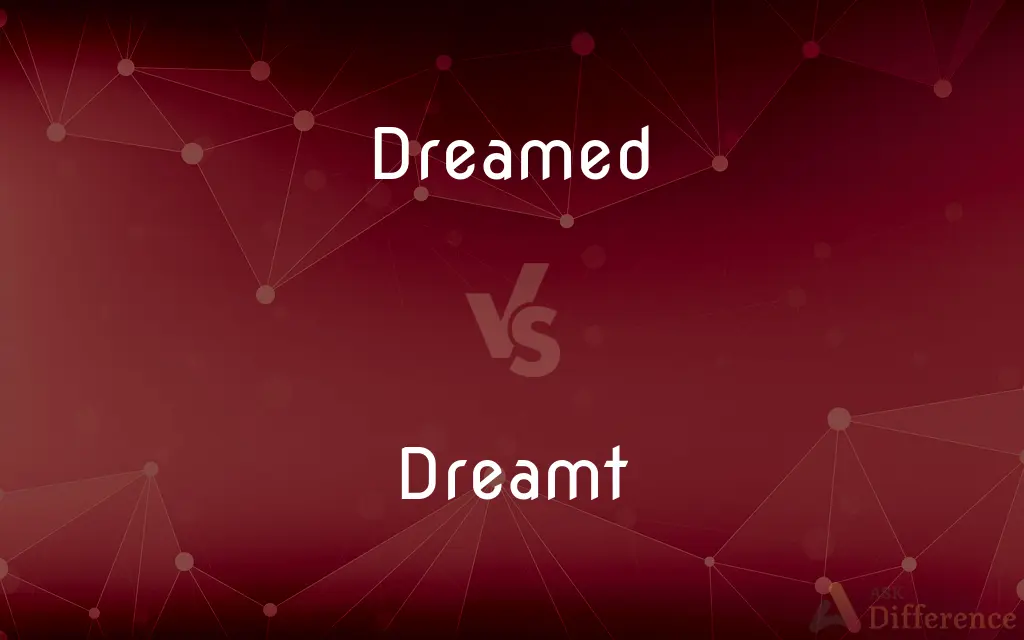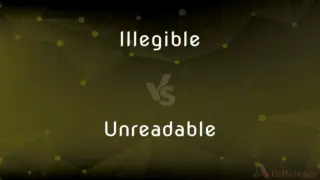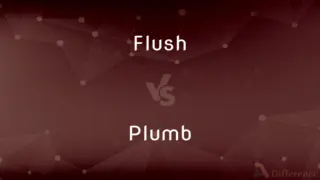Dreamed vs. Dreamt — What's the Difference?
Edited by Tayyaba Rehman — By Fiza Rafique — Updated on November 2, 2023
"Dreamed" and "Dreamt" are both past tense forms of "dream," with "dreamed" being more common in American English and "dreamt" in British English.

Difference Between Dreamed and Dreamt
Table of Contents
ADVERTISEMENT
Key Differences
Dreamed and Dreamt both serve as the past tense and past participle of the verb dream. Dreamed follows a regular verb pattern, commonly used in American English. Dreamt is an irregular verb form, more frequent in British English.
Dreamed often appears in American texts, reflecting the standard past tense structure. Dreamt carries a more archaic tone, often found in poetry or classic literature.
In everyday usage, dreamed is widely accepted and understood globally. Dreamt, however, may come across as stylistically particular and is less common in casual conversation.
The usage of dreamed vs. dreamt does not affect the meaning of the sentence; it's purely a matter of dialect and preference. Dreamed might be preferred for clarity in international communication.
Both forms, dreamed and dreamt, coexist without affecting the grammatical correctness of a sentence. The choice between them can depend on the rhythm of the sentence or the formality of the text.
ADVERTISEMENT
Comparison Chart
Usage
Predominant in American English
Common in British English
Spelling Pattern
Follows regular verb conjugation
Irregular verb conjugation
Frequency
More common globally
Less common, more archaic
Phonetic Length
Two syllables: /driːmd/
One syllable: /drɛmt/
Stylistic Context
Formal and informal writing
Often in poetry or classic literature
Compare with Definitions
Dreamed
Experienced a nightmare.
I dreamed a frightening scene.
Dreamt
Desired or wished for.
They dreamt of a world without war.
Dreamed
Imagined while sleeping.
She dreamed about flying last night.
Dreamt
Considered as a future possibility.
She dreamt of becoming an artist.
Dreamed
Thought of as possible.
They dreamed of a perfect wedding day.
Dreamt
Imagined while asleep.
Last night, I dreamt of distant lands.
Dreamed
Contemplated a future event.
He dreamed of winning the lottery.
Dreamt
Saw in a nightmare.
She dreamt a terrifying monster was chasing her.
Dreamed
Hoped for earnestly.
We dreamed of peace.
Dreamt
Pondered abstractly.
He often dreamt about time travel.
Dreamed
A series of images, ideas, emotions, and sensations occurring involuntarily in the mind during certain stages of sleep.
Dreamt
A past tense and a past participle of dream.
Dreamed
A daydream; a reverie.
Dreamt
Simple past tense and past participle of dream
Dreamed
A state of abstraction; a trance
Wandering around in a dream.
Dreamt
Or only extant in a dream or dreams.
Dreamed
A condition or achievement that is longed for; an aspiration
A dream of owning their own business.
Dreamed
A wild fancy or unrealistic hope
He knew that playing for a professional team was only a dream.
Dreamed
(Informal) One that is exceptionally gratifying, excellent, or beautiful
Her boyfriend is a dream.
Dreamed
To experience a dream in sleep
Dreamed of meeting an old friend.
Dreamed
To daydream
Sat there dreaming during class.
Dreamed
To have a deep aspiration or hope
Dreaming of a world at peace.
Dreamed
To regard something as feasible or practical
I wouldn't dream of skiing on icy slopes.
Dreamed
To experience a dream of while asleep
Did it storm last night, or did I dream it?.
Dreamed
To conceive as possible; imagine
We never dreamed it would snow so much.
Dreamed
To have as an aspiration or hope
She dreams that she will become a pilot.
Dreamed
To pass (time) idly or in reverie.
Dreamed
Simple past tense and past participle of dream
Dreamed
Conceived of or imagined or hoped for;
His dreamed symphony that would take the world of music by storm
Common Curiosities
Can I use dreamed and dreamt interchangeably?
Yes, they are interchangeable, but dreamed is more common in American English.
What does dreamt mean?
Dreamt is an alternative past tense of dream, used mainly in British English.
In which English dialect is dreamt more common?
Dreamt is more common in British English.
What does dreamed mean?
Dreamed is the past tense of dream, meaning imagined in sleep or aspired to.
Is dreamt considered incorrect?
No, dreamt is not incorrect; it's a stylistic variant.
Which form is more formal, dreamed or dreamt?
Neither is more formal; usage depends on regional preference.
Is there a difference in meaning between dreamed and dreamt?
No, there's no difference in meaning.
Do dreamed and dreamt have the same pronunciation?
No, they are pronounced differently.
In academic writing, which form should I use?
Use dreamed for American English and dreamt for British English if preferred.
How should I decide which form to use?
Consider your audience and the version of English they are more familiar with.
Will the use of dreamt be understood in the US?
Yes, it will be understood but may sound formal or old-fashioned.
Can dreamed be used in poetry?
Yes, dreamed can be used in poetry.
Are there any verbs similar to dream in terms of having two past tense forms?
Yes, verbs like learn (learned/learnt) and spell (spelled/spelt) have similar variations.
Is dreamt ever used in American English?
It's used, but less frequently.
Which form is more likely to appear on language proficiency exams?
Dreamed may appear more often, as it is more universally accepted.
Share Your Discovery

Previous Comparison
Illegible vs. Unreadable
Next Comparison
Flush vs. PlumbAuthor Spotlight
Written by
Fiza RafiqueFiza Rafique is a skilled content writer at AskDifference.com, where she meticulously refines and enhances written pieces. Drawing from her vast editorial expertise, Fiza ensures clarity, accuracy, and precision in every article. Passionate about language, she continually seeks to elevate the quality of content for readers worldwide.
Edited by
Tayyaba RehmanTayyaba Rehman is a distinguished writer, currently serving as a primary contributor to askdifference.com. As a researcher in semantics and etymology, Tayyaba's passion for the complexity of languages and their distinctions has found a perfect home on the platform. Tayyaba delves into the intricacies of language, distinguishing between commonly confused words and phrases, thereby providing clarity for readers worldwide.
















































